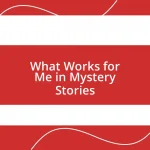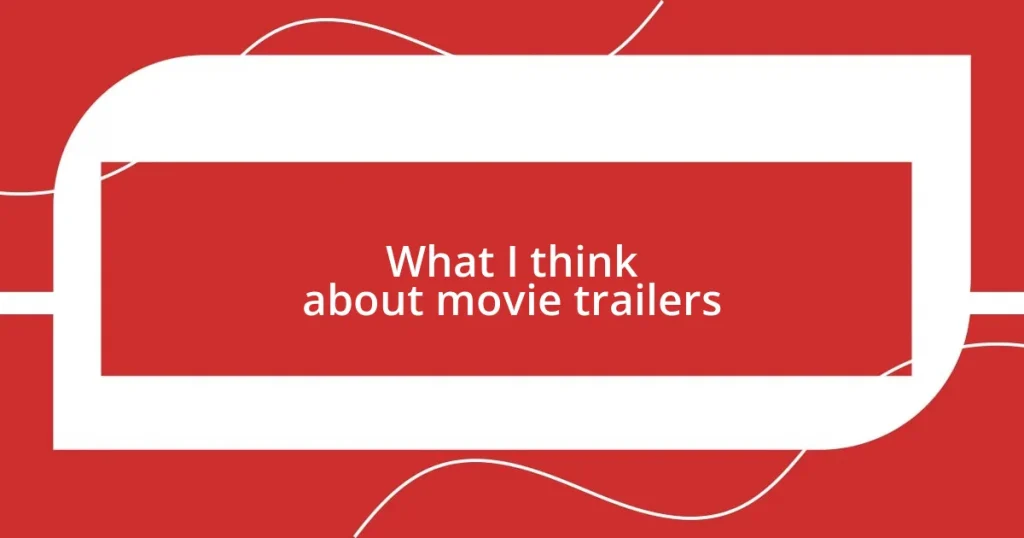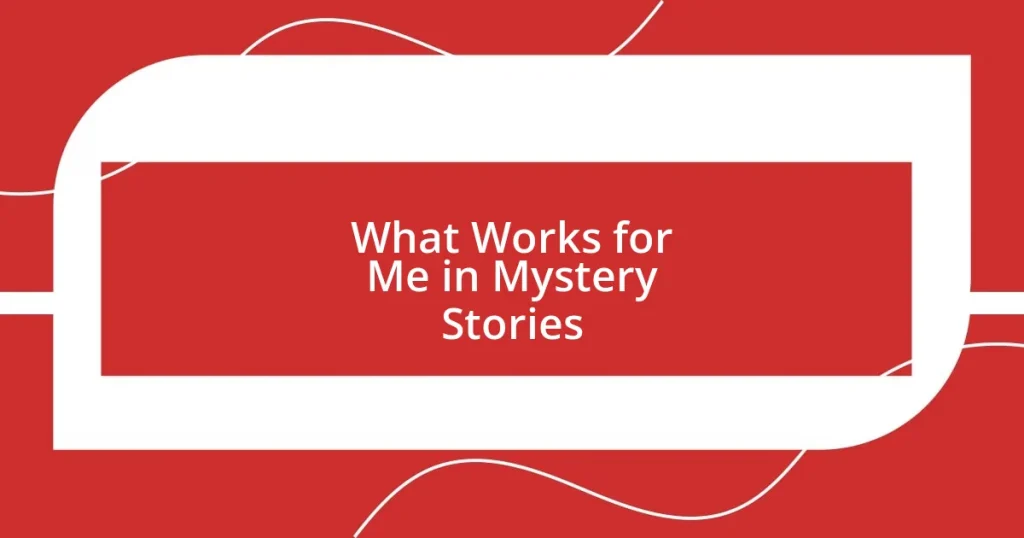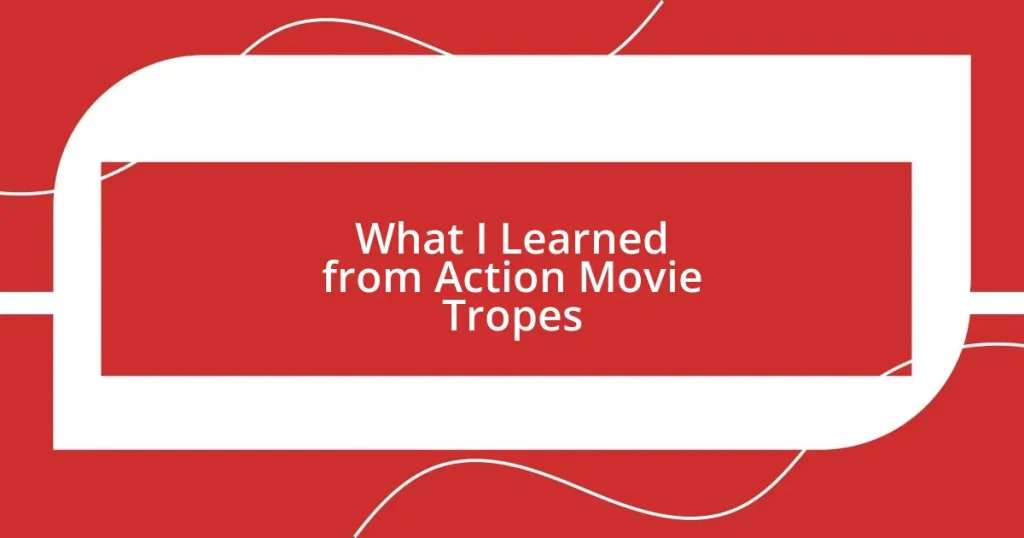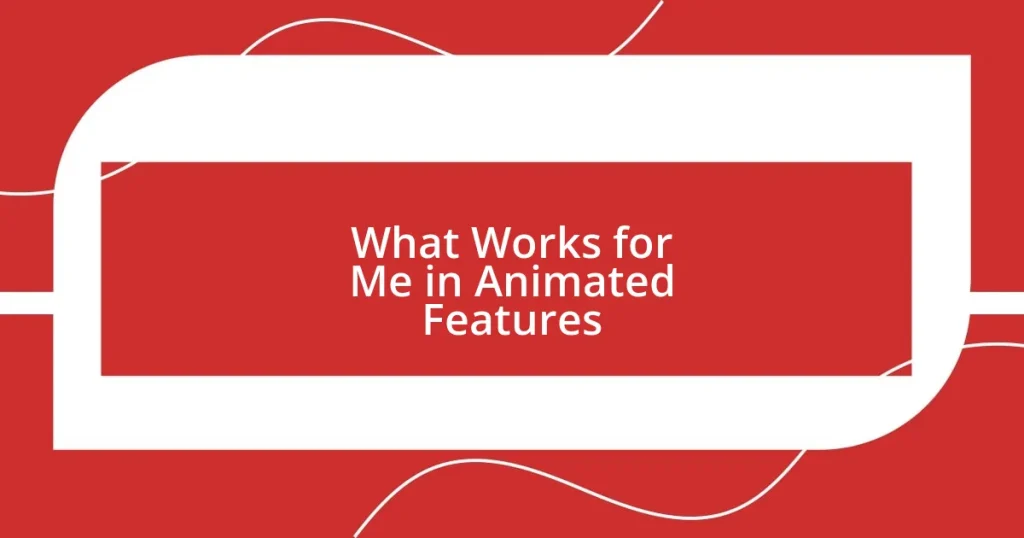Key takeaways:
- Movie trailers generate anticipation and excitement, serving as a powerful marketing tool that influences audience perceptions and expectations of films.
- Key elements of effective trailers include compelling visuals, engaging soundtracks, strategic storytelling, character spotlighting, and conflicting tension.
- Common mistakes in trailers involve clichés, revealing too much plot, and inconsistent tone, which can diminish audience interest and clarity.
- Trailers shape cultural conversations and community excitement, turning individual experiences into collective anticipation for upcoming films.
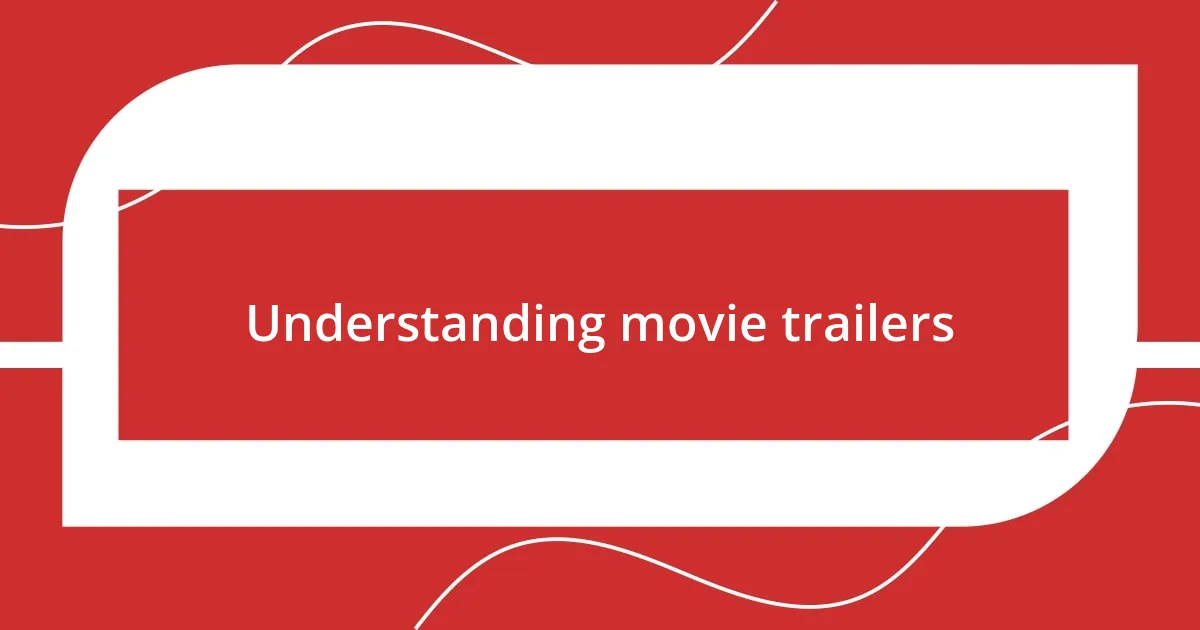
Understanding movie trailers
Movie trailers are like the appetizer before the main course, and I often find that they create a unique blend of anticipation and excitement. I still remember the adrenaline rush I felt watching the trailer for “Inception” for the first time—its mind-bending visuals and haunting score left me questioning reality itself. Isn’t it fascinating how a couple of minutes can evoke such strong emotions and set the tone for the entire film?
There’s an art to crafting a great trailer; it needs to strike the right balance between revealing enough to pique interest and keeping key plot twists under wraps. For instance, after seeing the trailer for “Get Out,” I was hooked, yet apprehensive about what lay ahead. Have you ever felt that magnetic pull where a trailer just stays with you? It’s like a puzzle begging you to piece it together.
Trailers also serve as a reflection of the film’s marketing strategy. When I saw the trailer for a lesser-known indie film, it emphasized character depth over action-packed sequences—something that drew me in as a cinephile. How do trailers manage to connect with different audiences? By tapping into specific emotions and themes, they create a sense of community among viewers who might seek similar storytelling experiences.
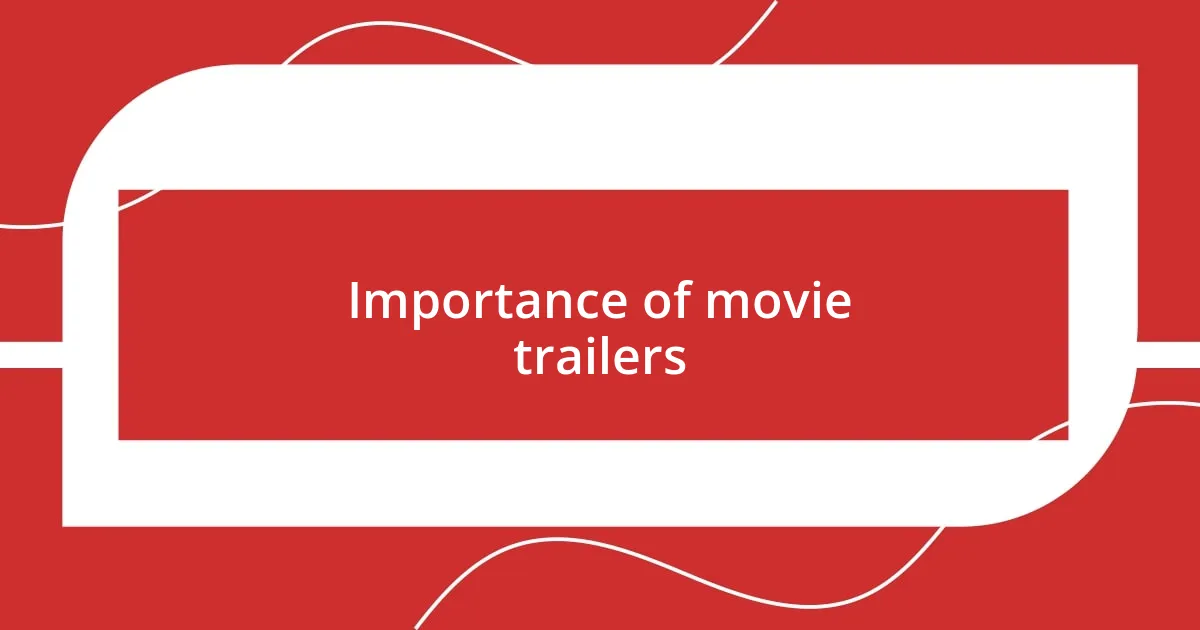
Importance of movie trailers
The significance of movie trailers cannot be overstated; they often dictate the first impression a film makes on its audience. I can vividly recall the anticipation building within me after watching the trailer for “The Dark Knight.” The powerful montage of scenes, combined with Heath Ledger’s iconic voice-over, gave me chills and convinced me that this film would be a cinematic experience like no other.
Moreover, trailers function as essential guides for audiences, helping them navigate the overwhelming array of choices available in theaters. When the trailer for “La La Land” came out, I felt drawn not just by the visuals but also by the emotional gravity of its music. This combination made me realize how effectively a well-crafted trailer can convey a film’s essence, allowing us to quickly decide whether it resonates with our own tastes.
Finally, trailers play a pivotal role in shaping conversations around upcoming films. I remember when the teaser for “Star Wars: The Force Awakens” dropped; it ignited debates, theories, and excitement across various platforms. This shared enthusiasm demonstrates how trailers can transform a personal viewing experience into a collective cultural phenomenon, uniting fans in eager anticipation.
| Purpose | Impact on Audience |
|---|---|
| Generate Anticipation | Creates excitement and curiosity |
| Guide Film Selection | Helps in the decision-making process |
| Foster Community | Encourages discussions and shared experiences |

Elements of an effective trailer
When I think about the elements that make a trailer truly effective, a few key components come to mind. One standout feature is pacing. I remember being completely enthralled by the rhythm of the “Mad Max: Fury Road” trailer; it perfectly matched the energy of the film itself, making my heart race with excitement. A well-orchestrated build-up captivates the audience and keeps them on the edge of their seats.
Here are some elements that contribute to an effective trailer:
- Compelling Visuals: Stunning imagery captures attention and evokes emotion.
- Engaging Soundtrack: A memorable score or song can enhance the trailer’s emotional depth.
- Strategic Storytelling: Providing just enough plot to intrigue without revealing spoilers is crucial.
- Character Spotlight: Brief glimpses into characters’ personalities can create an emotional connection.
- Conflicting Tension: Highlighting conflicts or stakes increases viewer investment in the story.
I believe one of the most impactful aspects of a trailer is its ability to evoke strong emotions through strategic editing. Take, for example, the emotional journey I felt watching the trailer for “A Star is Born.” The scenes showcasing vulnerability and triumph were meticulously curated, making me feel an intrinsic connection to the characters long before the film commenced. It’s not just about showing the film; it’s about instilling a sense of longing for the full experience.

Analyzing popular trailers
When I analyze popular trailers, I often consider how they leverage iconic scenes to create buzz. For instance, the trailer for “Inception” showcased mind-bending visuals that left me questioning reality. Can you imagine the experience of trying to piece together those dream-layered narratives just from what you see in a two-minute clip? It’s a testament to how well-edited clips can spark curiosity and ignite discussions long before a film hits theaters.
Looking back, I recall the excitement surrounding the “Frozen” trailer. The moment I heard “Let It Go,” I felt truly connected not only to the music but to the characters’ struggles. It was a brilliant example of how a single song can enhance a trailer’s emotional pull, gripping audiences and leaving them eager to see how that sound transformed into a full narrative. It made me wonder—how often does a song in a trailer create a loyal fanbase before the movie is even released?
Another layer to consider is how some trailers take creative risks. Take the haunting teaser for “Her,” which relied on visual simplicity and emotional weight rather than heavy action. It left many viewers captivated, even if they didn’t fully understand the premise. I find myself asking, do the best trailers tap into universal emotions rather than just flashy effects? This approach allows for deeper connections, allowing the audience to resonate with the story beyond traditional expectations.

Common mistakes in trailers
When it comes to common mistakes in trailers, one of the most glaring issues I often notice is the over-reliance on clichés. I remember watching a trailer that started with a familiar voiceover and slow-motion shots, which immediately felt played out. It made me wonder—aren’t filmmakers aware that these tropes can dilute the excitement they aim to create? Instead of sparking curiosity, they often leave audiences feeling like they’ve seen it all before.
Another pitfall is revealing too much of the plot. I once saw a trailer that included the film’s climax. Instead of feeling intrigued, I found myself questioning why I should even watch the movie now that I knew the outcome. I’ve learned that the best trailers tease just enough to create suspense without spoiling key moments. What’s the point of a trailer if it takes away the thrill of discovery?
Lastly, inconsistent tone can completely ruin a trailer. I vividly remember a film’s trailer that vacillated between dark and lighthearted moments without a clear direction. As a viewer, it left me confused about what to expect from the actual movie. I often ask myself, how can I connect with something that doesn’t even know what it wants to be? Cohesion in a trailer is essential; it sets our expectations and draws us in with a promise of what’s to come.
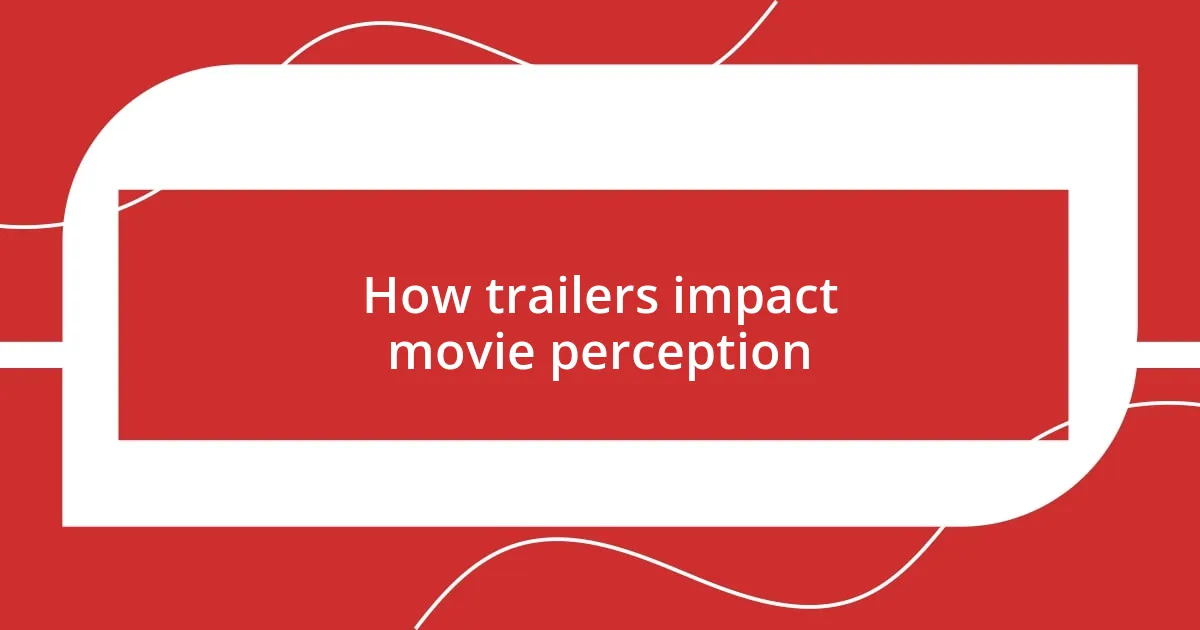
How trailers impact movie perception
Thinking back on how trailers shape our perception, I can’t help but notice their immense power in influencing our expectations. For example, I remember watching the trailer for “Mad Max: Fury Road.” The intense action sequences and striking visuals had me convinced that this film would redefine the action genre. Did it deliver? Absolutely. But I find it fascinating how that initial excitement can color our entire viewing experience.
What often surprises me is the emotional resonance a well-crafted trailer can evoke. I’ll never forget the first time I saw the trailer for “A Star is Born.” The raw vulnerability of those performances pulled at my heartstrings, compelling my friends and me to talk about our own struggles with self-identity and love long before we even saw the film. Doesn’t it make you wonder how a mere two-minute clip can spark such deep conversations about personal experiences?
On the flip side, trailers can also set unrealistic expectations, leading to disappointment. I once watched the trailer for “The Great Wall,” which had me hyped with its epic visuals and star-studded cast. However, when the film didn’t match that grandeur, I felt misled. It makes me think: how crucial is it for trailers to strike a balance between showcasing potential and accurately reflecting the film? This dichotomy can significantly impact how we perceive and ultimately enjoy a movie.
